Doing an ant PhD: Marina Natalia Psalti
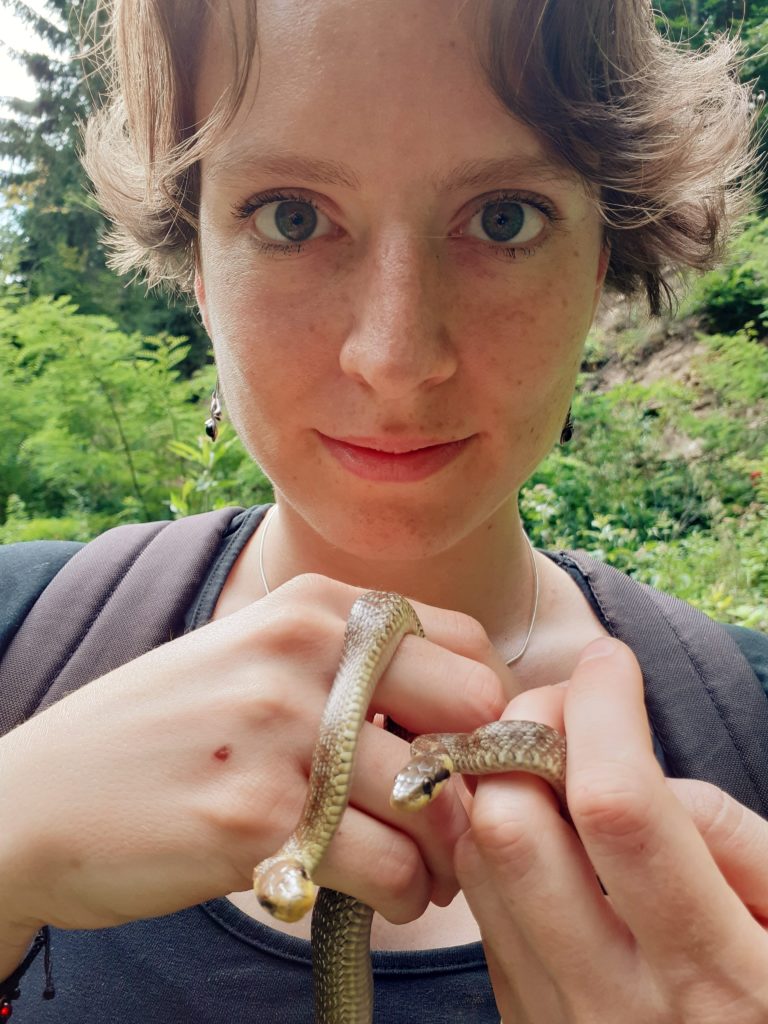
Marina Natalia Psalti is 27 years old and a PhD student at the University of Mainz. She works in the lab of Romain Libbrecht and investigates the genetic components of the division of labor behavior in ants. Here, we talk about her PhD thesis, why she works with ants, and how she gets over a period of low motivation.
An Interview compiled by Emeline Favreau, Patrick Krapf, and Sheethal Vepur Ramamurthy

MNB: Could you tell us a little bit about yourself?
MNP: I am 27 years old and born in Athens, Greece. I came to Germany when I was 6 years old and loved growing up in different cities in Bavaria. But, even after 21 years of staying in Germany, my roots, the biggest part of my family and my heart are still there. I did my bachelor’s in Biology in Würzburg. There, my fascination for the complex interactions between animals grew. I wanted to study social behavior, however, I had some ethical concerns about manipulations on higher organisms or vertebrates in general. I am equally fascinated by the complex interactions of all individuals within ecosystems. This led me to Evolutionary Ecology with a strong focus on organismic Zoology and Ecology. For my Bachelor’s thesis, I had the opportunity to investigate the habitat use of the Aesculapian snake Zamenis longissimus, the largest snake in Europe (Snakes are a big love of mine as long as I can remember). After that, I was looking for a Master with the same focus area in Behavioral Ecology and ultimately found my way to Mainz, to this amazing work group where I ended up doing my PhD.
MNB: What is the topic of your PhD thesis?
MNP: I investigate the genetic components of the division of labor behavior in ants.
MNB: In which year of your PhD studies are you now?
MNP: 2nd year
MNB: So still a little time left. And why ants?
MNP: This is one of the most frequent questions I get asked. There are many reasons: Firstly, their ecological importance. They are in almost all terrestrial habitats and usually have a big influence on their ecosystems. Secondly, they are eusocial, which most people aren’t aware of. Like the honeybee, ants have one queen which reproduces, the rest of the colony do not. All workers are female and do not reproduce This fascinating system enables us scientists to investigate a complex form of social organization while working with relatively simple organisms.
MNB: How do you feel about fieldwork?
MNP: I really enjoy fieldwork. I had 3 months of fieldwork during my Bachelor’s thesis investigating the Aesculapian snake and its habitat use in a forest. For me it was the perfect amount of time. If fieldwork is too long, especially if you are alone all the time it can become tiresome. During my PhD, I only had a few days of fieldwork. It was either to collect my model organisms, the Argentine ant Linepithema humile, in the south of France or collecting founding queens of the black garden ant Lasius niger.
MNB: And how about identifying ants using a key?
MNP: To be honest, I didn’t have to identify ants using a key yet, but I am not averse to it. I work with the invasive form of the Argentine ant, which is very dominant and abundant wherever it occurs. This made it also very easy and quick to collect them in the field, once we found them.
MNB: And do you enjoy working in the wet lab?
MNP: My lab experience is relatively limited to my studies. I don’t work in a wet lab, but I am doing all behavioral experiments under controlled conditions in a climate chamber.
MNB: Oh wow, sounds interesting!
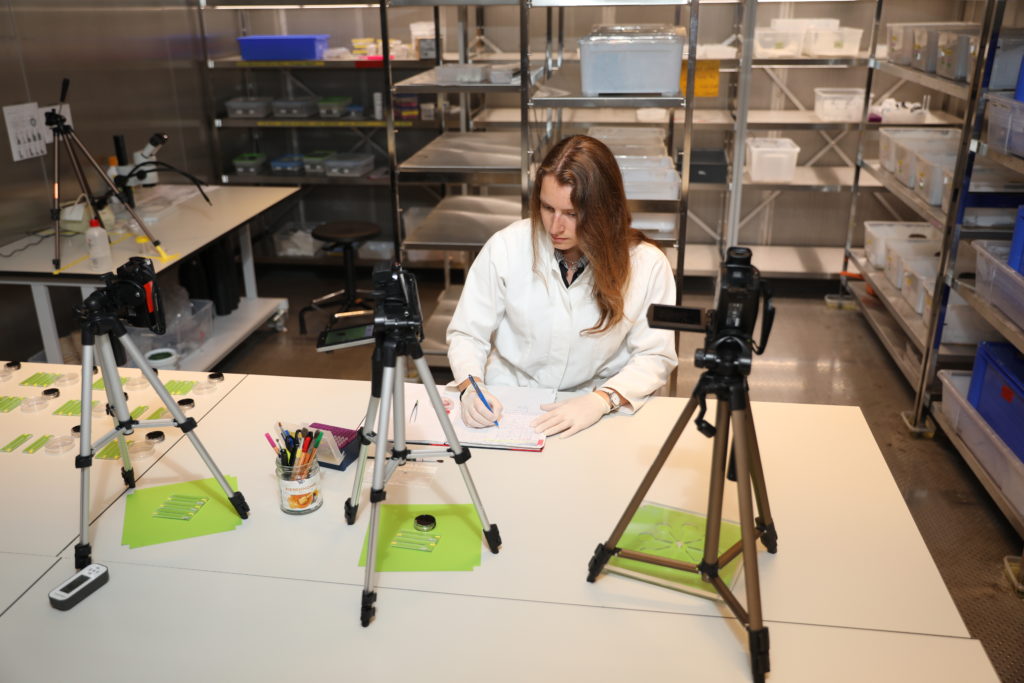
MNB: And so far, have you been involved in any of the -omics approaches (e.g., genomics, transcriptomics, proteomics), and what was your experience?
MNP: I had no prior experience with –omics analyses at the beginning of my PhD but I attended some courses and played around with some data. I will use transcriptomic data to answer the main question of my PhD. I will be trying to find out which genes and pathways are involved in the division of labor behaviors. Therefore, a big part of my PhD is working with transcriptomics data which I am really looking forward to. It is exciting to me how much information can be drawn out of these –omics data.
MNB: I guess the data will be really exciting.
MNB: Did you acquire your statistics knowledge in university courses, from your supervisor, or on your own?
MNP: I would say that I had good supervisors who were very skilled in statistics. They taught me a lot in courses but mainly through my own projects. However, every time I have to analyze data I go back to my notes, the literature, and my scripts to teach (it to) myself again.
MNB: And when you think of meeting your supervisor – what is the ideal frequency of meeting him for discussing your research from your point of view: daily, weekly, monthly?
MNP: This depends very much on which phase of the project I am in and how many problems and questions I encounter. There used to be a time when I had to ask my supervisor for little things several times a week. I prefer rather asking more questions before making mistakes. Since no one else in our lab works with my organism, the Argentine ants, only my supervisor had experience with them, and I asked mostly him. Later during my PhD, I asked him for weekly meetings, and by now, during my experimental phase I keep him up to date maybe every 2-3 weeks. Later, when I need to analyze my data our meeting frequency will increase again.
MNB: If you have a great idea, how do you find out if it’s really great: sitting down and thinking, discussing with your supervisor, discussing with colleagues from the group, discussing with someone not into science?
MNP: I usually discuss my ideas and questions with my colleagues first. It excites me if they don’t have a solid answer which makes me think more about it. Then I go to my supervisor, with whom I enjoy discussing my ideas a lot. He usually has a good overview of the literature, he is very open to new questions and usually points me towards good directions.
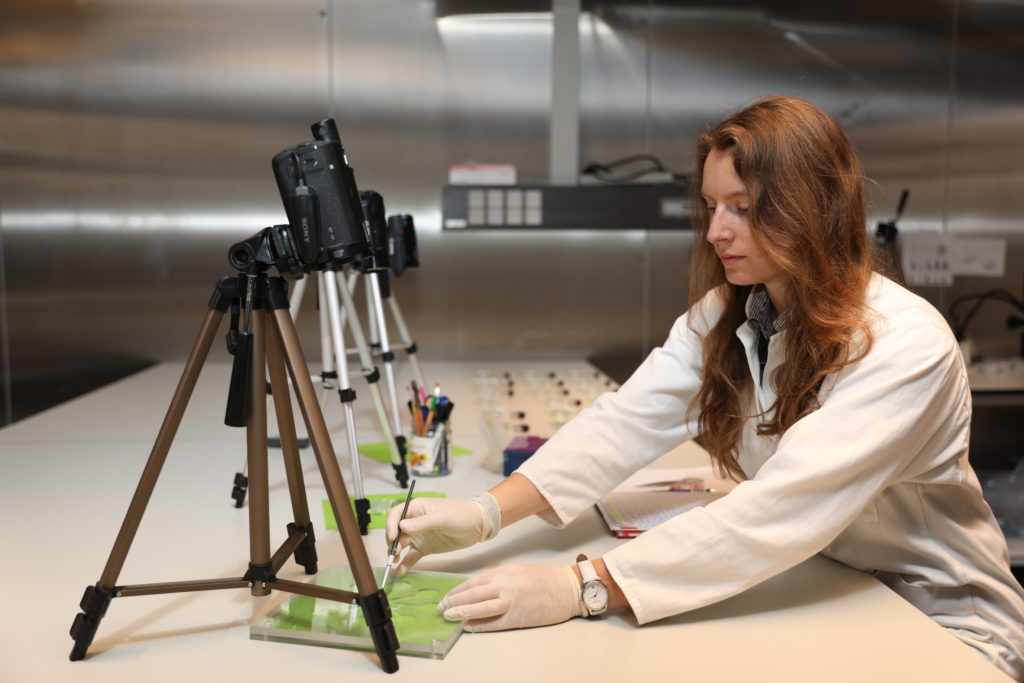
MNB: How many papers do you read in an average week?
MNP: I would say two to three papers, which is much less than I would like to. Although reading is very important there are phases where there is just not enough quiet time to dedicate for reading. Of course in phases of writing publications, all I do is read before I start writing anything.
MNB: And in an ideal world, is the working group you belong to small or large?
MNP: In an ideal world, everything would be balanced. Not too big, so that I never see my supervisor but also not too small so that I have several colleagues to exchange ideas and experiences with.
MNB: And ideally, is your uni close to your field-work site or in an urban area?
MNP: In my PhD, I don’t have any field work except for ant collections, so I am happy about our institute being very close to the city.
MNB: And when you think of conferences, have you profited more from attending conferences with narrower or with a broader scope?
MNP: So far, I have attended two conferences, one workshop, and one symposium with both narrow and more broad scopes. For my work, it was more interesting to hear talks similar to my work. The broader talks were also very interesting but more satisfying my own curiosity than being useful for my research.
MNB: What is most relevant to you at a conference: attending talks, giving a talk, meeting senior scientists, meeting other students?
MNP: I would say attending talks and meeting junior and senior scientists at the poster sessions. This is where I am more likely to get ideas from. So far, I have given one talk at a smaller conference which is not comparable to a big international conference. But it is definitely on my bucket list.
MNB: Did you ever participate in a science slam and if so, what was your experience?
MNP: No I haven’t.
MNB: If you would get 100,000 Dollars to spend on your research project, what would you do with it?
MNP: I would probably use the money for sequencing more samples which are relatively costly. Additionally, I could imagine trying a new method, like CHIP-Seq to gain deeper insight into the molecular mechanisms. Also, what I have been very curious about lately is single-cell sequencing which supposedly is quite costly.
MNB: And in your free time, what helps you best to relax from work?
MNP: What works best for me is sports, like bouldering/climbing and any form of physical workout. Second best, or usually in addition to that is playing an instrument or singing. These are hobbies that usually have a social aspect to them and make me feel good (about myself) because it is something active and productive. But if I feel like having a lazy day, then I will watch a movie, read a book, or play some video games.
MNB: It seems that you balance your free time just right.
MNB: How do you celebrate successes like getting a paper accepted, a proposal granted, or the like?
MNP: Of course by sharing the news with my family and friends! However, more importantly than openly celebrating to me is keeping in mind what I do the hard work for. It helps me to stay positive whenever things are not going too well.
MNB: What is your personal trick to get over periods of low(er) motivation?
MNP: I remind myself why I started in the first place, how much I wanted it, how much I have already achieved, and where it will ultimately lead me. In these phases, I usually lean more on my friends and hobbies to cheer me up.
MNB: And what do you do to get over frustration about what you consider as unfair criticism by a reviewer?
MNP: I haven’t had that so far.
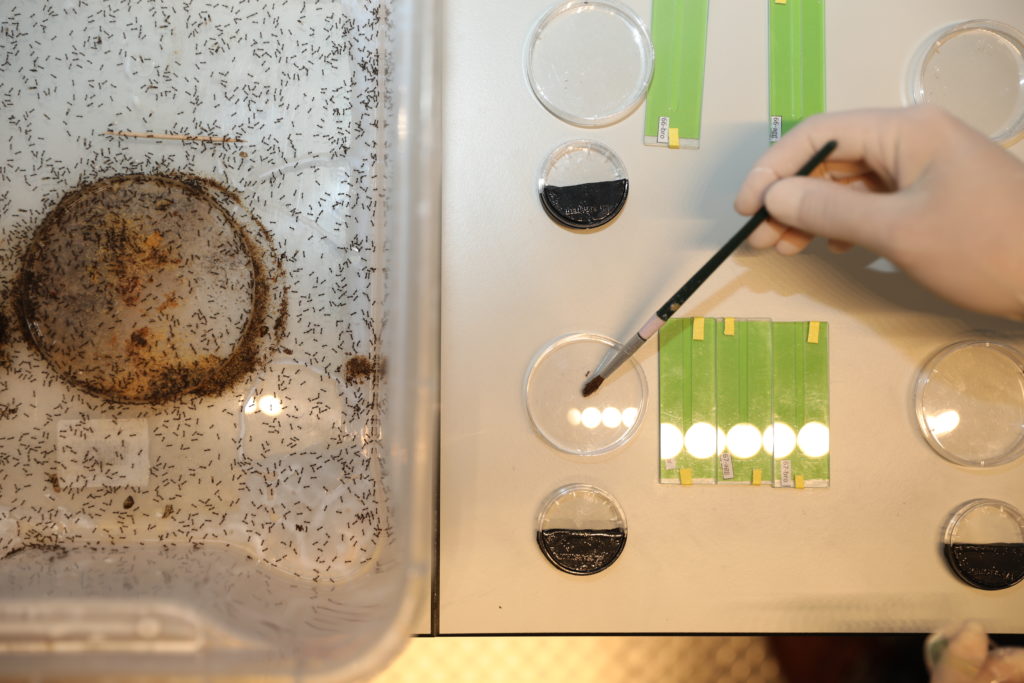
MNB: What is the one thing you would do differently when starting your PhD thesis again?
MNP: I could say something obvious that I learned through big and painful failure, however, it is such a small thing that it seems stupid. I would have fed my ants with fresh food since the beginning. They didn’t seem to like the same food if it was priorly frozen since after a year my colonies in the lab collapsed and I had to start over with everything.. This would have potentially saved me a lot of time but sometimes you have to learn through experience.
MNB: Would you like to stay in science?
MNP: I haven’t decided yet. I haven’t even received my first rejection of a paper or unfair criticism. Also, I want to see how I feel about science when I am in the last months before actually writing my thesis and then I will weigh my options.
MNB: If you will be supervising PhD students yourself, what will be the most important thing you will expect from your students?
MNP: Self-motivation and persistence. I think these two things are equally important and critical in finishing a PhD.
MNB: And tying to this – what will be the most important thing you will want to take care of in supervising?
MNP: To take time for the student and patiently advise and discuss whenever needed and to be available for the student as much as I can.
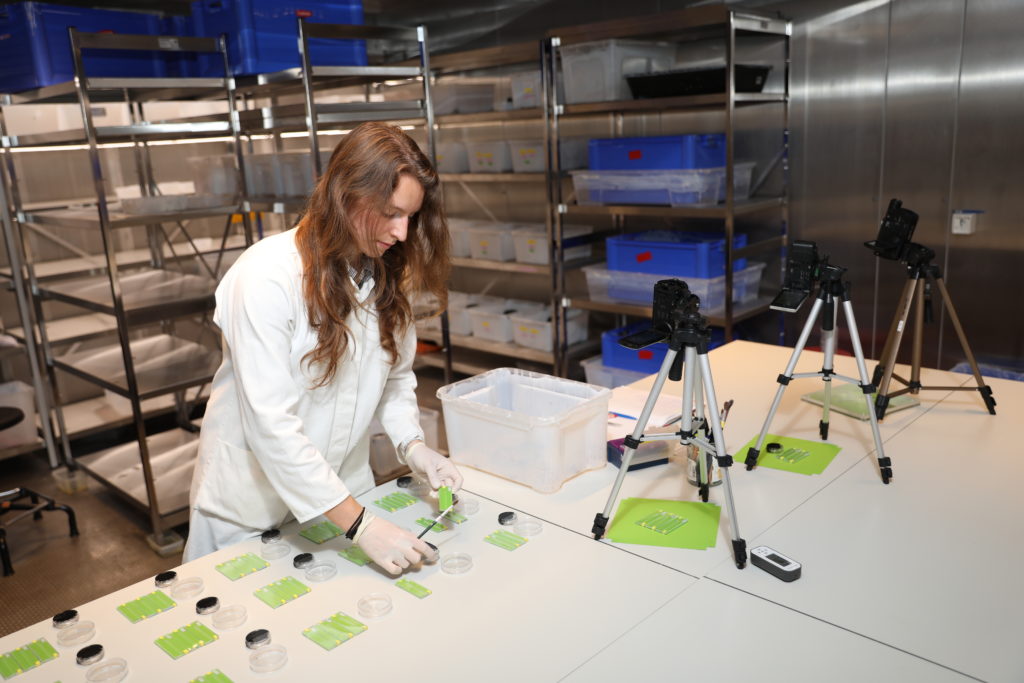
MNB: Original article or review article?
MNP: Review.
MNB: Reading or writing?
MNP: Reading.
MNB: Writing or reviewing?
MNP: Writing.
MNB: Reviewing or considering criticism by someone else?
MNP: Reviewing.
MNB: The first or last 5% of the time you spend with writing a manuscript?
MNP: Last 5%, when everything is almost safe and sound.
MNB: Informative or sexy paper title?
MNP: Sexy title.
MNB: Table or figure?
MNP: Figure, more fun to look at.
MNB: Web of Science or Google Scholar?
MNP: Google Scholar.
MNB: Journals financed by the author (open access) or the reader (subscription)?
MNP: Open access.
MNB: Windows, OS, or Linux?
MNP: Windows.
MNB: Command-line or graphical-user interface?
MNP: Graphical. Command-lines are a lot of fun as well.
MNB: Mouse or touchpad?
MNP: Mouse.
MNB: Facebook or Twitter?
MNP: Neither.
MNB: Bus or bike?
MNP: Bike when it’s warm enough.
MNB: Breakfast or dinner?
MNP: Dinner.
MNB: Sun or rain?
MNP: Sun.
MNB: Diploid or haploid?
MNP: Diploid.
MNB: Sting or acid?
MNP: Sting.
MNB: Social parasite or host?
MNP: Host.
MNB: Your favourite ant?
MNP: Oocephylla smaragdina because I had seen them in Australia and was amazed by their looks – cute but with their upright green gaster also a bit threatening.
MNB: … and if in another life you would be an ant, what ant would that be?
MNP: Any species of leaf-cutter ants in the Amazon.
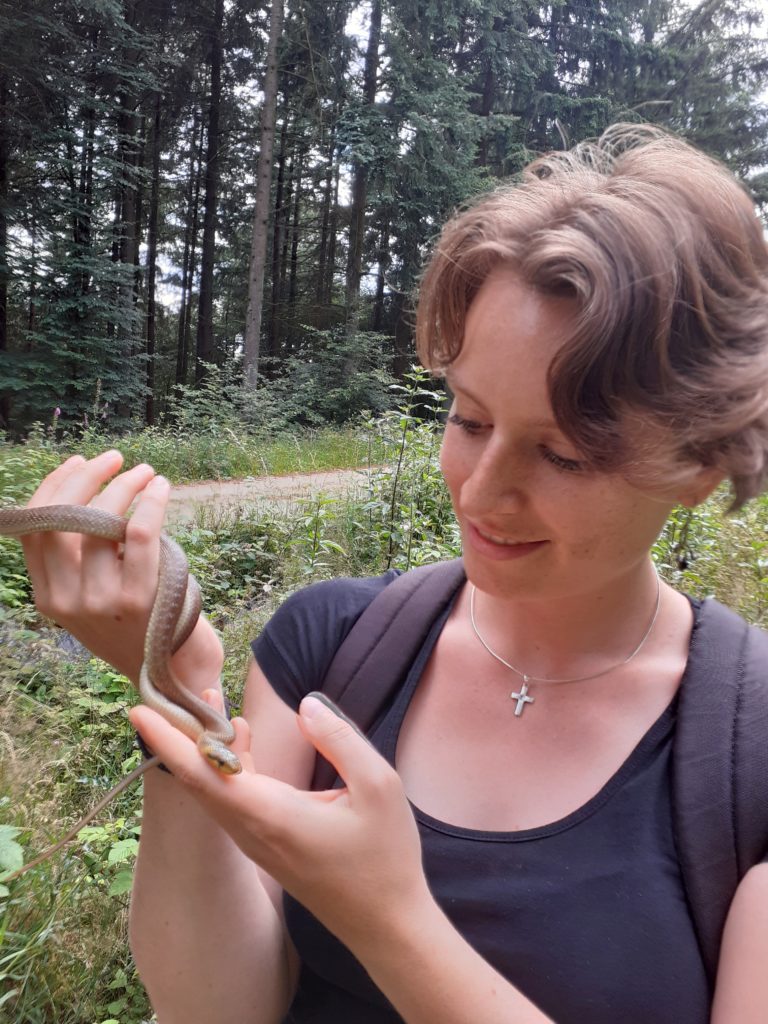


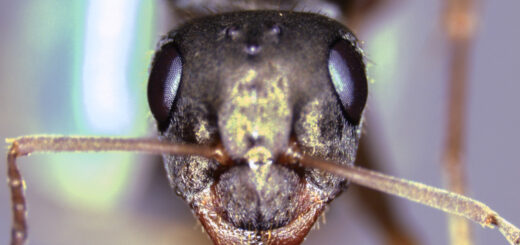

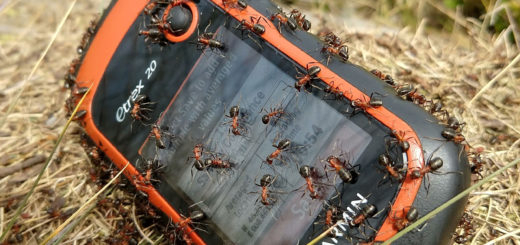
Fantastic interview 👍
Toll Natalia. Freut mich, dass du ein Biologiestudium abgeschlossen hast. Ich wünsche dir weiterhin viel Freude und Erfolg bei deinen interessanten Studien.